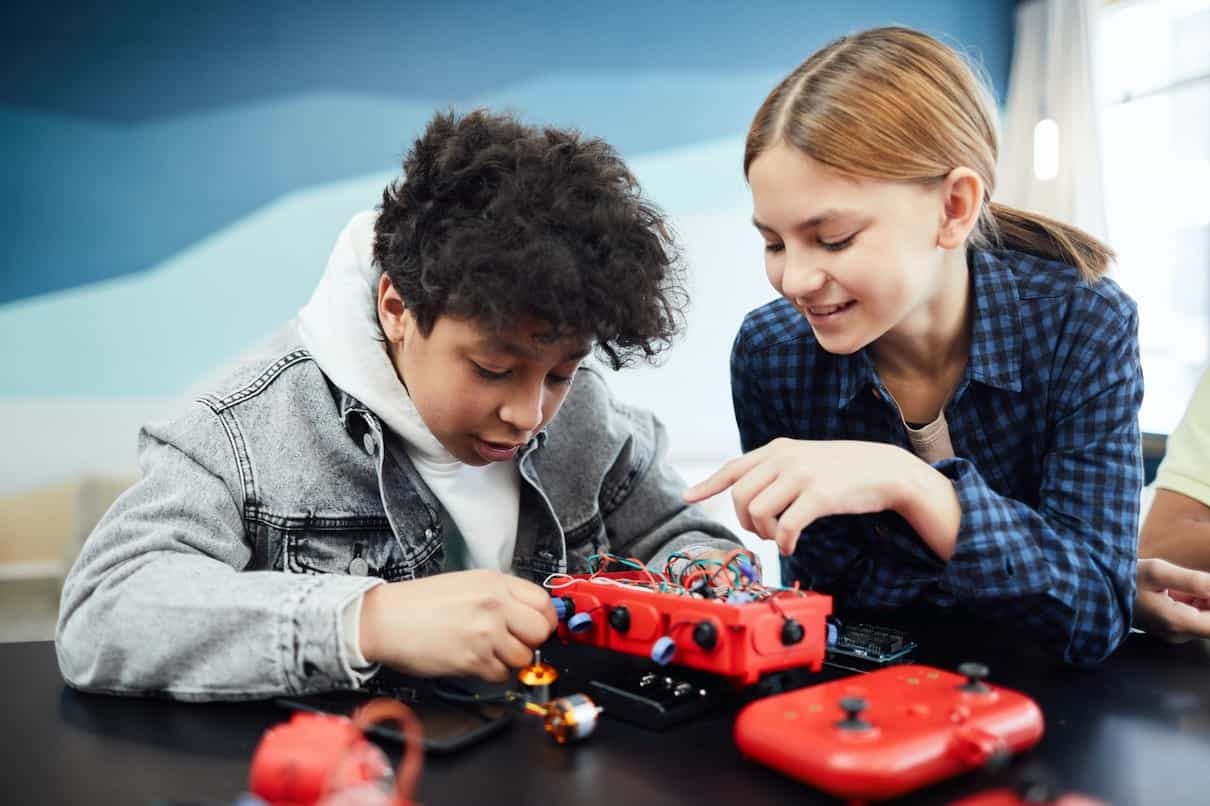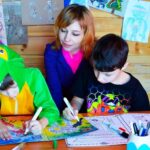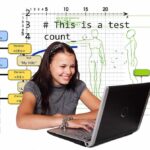Project-Based Learning (PBL) is a method of instruction based on realistic learning experiences and activities that inspire and engage both primary and secondary level students. This article shows how to use and implement the project-based learning method of instruction and provides many free resources and materials to put it into practice.
Quick Links to Free Project-Based Learning Resources in this Article:
- Components of Project-Based Learning (PBL)
- The Guiding Principles of Project-based Learning
- Project-Based Learning Resources and Materials
Components of Project-Based Learning (PBL):
Project-based learning is often carried out by groups of students working toward a shared objective. Individual performance is evaluated based on the quality of the product created, the depth of topic knowledge demonstrated, and contributions made to the ongoing project’s implementation. Additionally, project-based learning enables students to think critically about their own thoughts and ideas, to exercise their voice and choice, and to make choices that impact project results and the learning process as a whole.
- The core concept of project-based learning is that real-world challenges spark students’ attention and demand deep thinking as they acquire and apply new information in a problem-solving setting.
- The instructor serves as a facilitator, assisting students in framing relevant questions, creating meaningful assignments, coaching both knowledge growth and interpersonal abilities, and then analyzing what students have gained from the course of study.
- Typical projects propose a problem to address (How can we eliminate pollution in the schoolyard pond?) or a phenomenon to explore (What causes thunderstorms?).
- PBL is an effective method of instruction for important subjects, replacing other conventional forms of education, including textbook or workbook tasks and lectures.
The Guiding Principles of Project-Based Learning:
- The project is structured around a motivating issue or challenge.
- Provides a need to know essential subject matter and skill sets.
- Inquiry and investigation are required in order to learn and/or develop something new.
- Demands critical thinking, problem solving, cooperation, and multiple forms of communication.
- Permits a certain amount of student input and freedom.
- Integrates feedback and adaptation.
- This results in a publicly demonstrated result or achievement.
Taking these factors into account, we describe Project-Based Learning as a systematic teaching style that involves students in the acquisition of vital information and life skills via a thorough, student-influenced investigation process centered on challenging, realistic questions and well-crafted products and assignments. In other words, it is an instruction approach that encourages students to work together to solve complicated issues by bringing together, applying, and building upon what they already know or can easily acquire.
Project-Based Learning Resources and Materials
- 6 Stages of Reflection Template.pdf
- Begin with the End in Mind.pdf
- Craft the Driving Question.pdf
- General PBL Planning Template.pdf
- Learn About Project Based Learning.pdf
- Manage the PBL Process.pdf
- Map the Project 1.pdf
- Map the Project 2.pdf
- Plan the Assessment 1.pdf
- Plan the Assessment 2.pdf
- Project Design Rubric.doc
- Project Design Rubric.pdf
- Project Design Template.doc
- Project Design Template.pdf
- Project Planner.docx
- Project Planner.pdf
- Project Planning Forms.pdf
- Project-Based Learning Lesson Template 1.doc
- Project-Based Learning Lesson Template 1.pdf
- Project-Based Learning Lesson Template 2.doc
- Project-Based Learning Lesson Template 2.pdf
- Self Evaluation – Secondary.doc
- SMART Goal Planner.pdf
Project-Based Learning Logs and Journals (doc files):
- Daily Learning Log
- Daily Reflection Exit Slip – Primary 1
- Daily Reflection Exit Slip – Primary 2
- Daily Reflection Log – Primary
- Daily Reflective Exit Slip
- Individual Reflection Journal – Secondary
- Learning Log
- Learning Log – Intermediate
- Project Learning Log – Secondary
- Research Log 1
- Research Log 2
- Research Log 3
Task Management and Student Contracts (doc files):
- Cooperative Group Contract
- Daily Work Log
- Group Activity Log
- Group Contract Checklist – Secondary 1
- Group Contract Checklist – Secondary 2
- Group Task Log
- Group Observation Checklist
- Group Project Management Log
- Interview Technique Handout
- Project Storyboard
- Personal Project Plan
- Personal Workplace Skills Survey
- Project Evaluation Survey
- Project Task Chart
- Reliable Resource Checklist – Secondary
- Resource List and Data Sheet – Secondary
- Sample Group Contract – Primary
- Task Analysis Chart – Secondary
- Task Management Chart
- Task Management Chart – Secondary
- Team Contract – Primary
- Team Contract – Secondary
- Team Contract Template – Secondary
- Team Members Contract – Primary
- Works Cited or Bibliography – Primary
- Leadership – Effort Bonus Worksheet
Self and Peer Assessments (doc files):
- End-of-Project Reflection – Secondary
- Project Reflection
- Project Peer Evaluation – Secondary
- Project Reflection – Secondary
- Project Self Assessment
- Self Reflection on Learning
- Self Assessment for Effort – Secondary
- Self-Evaluation Form – Secondary
- Self-Evaluation Form – Primary
- Self- Examination Rubric – Primary
- Self Reflection for Multimedia Presentation
- Student Self Assessment
- Teacher Reflection
- Team Effort Reflection
- Team Reflection Sheet
Online Resources for Project-Based Learning
- 5 Keys to Rigorous Project-Based Learning
- 8 Essentials for Project-Based Learning
- Assessment of Individual Performance in Groups
- Problem Library for PBL Problems from the University of Delaware
- Feedback Action Plan form
- Rubric to Evaluate PBL Problems
- PBL Rubrics from the West Virginia Dept. of Education
- Project Idea Rubric
- Math Project Ideas: Examples of Project-Based Learning
- Social Studies Projects & Ideas for PBL History, Geography & Civics
- Project Based Learning Science – Lesson Plans for PBL
- 20Time: a free 12-week project-based learning course by Laura Randazzo for 8th–12th graders in which each student devotes 20% of their learning time to an independent, meaningful project. This project-based learning (PBL) is designed to assist middle school and high school students and provides materials for language arts and career learning. She has made the materials for this PBL available for everyone in this free package of pdf files. (Free registration is required at Teacherspayteachers.)
- Free Project-based Learning Materials from Pblworks (free reg. is required for some):
- Essential Project Design Elements
- Projects for Project-based Learning from Pblworks
- Project-based Learning Videos, planning forms and rubrics from Pblworks
- Self-Reflection on Project Work
- Project Design: Overview and Student Learning Guide
- Thinking Routines and Project Path
- PBL How-Tos, Suggestions, Steps, and Planning Tools:
- Suggested Ideas for Projects to Do at Home:
- Real-world Examples of Project-Based Learning:
– love learning -your best ed lessons guide, Scott




